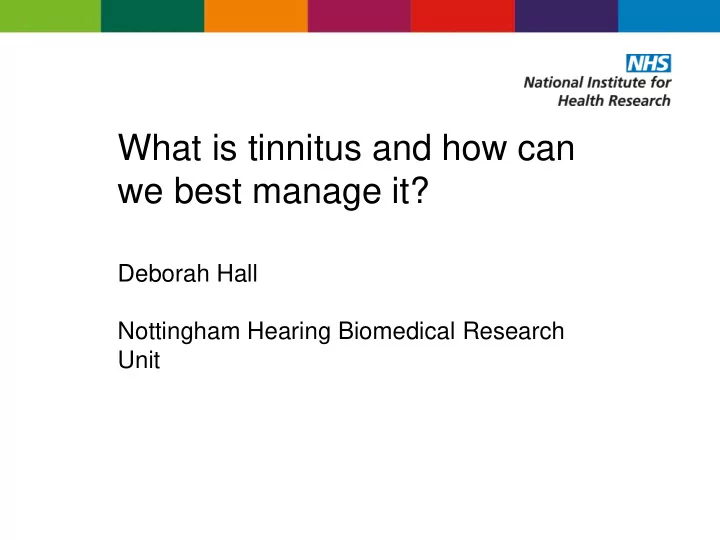

What is tinnitus and how can we best manage it? Deborah Hall Nottingham Hearing Biomedical Research Unit
Nottingham: The UK’s interdisciplinary hub for hearing research Basic Translational Clinical Advancing insight, innovation, and impact Nottingham Hearing Biomedical Research Unit
What is tinnitus? Describe your tinnitus sound in words! • “ tsssssssss+bzzzzzzzzzz+beeeeeeeee ” • “like a washing machine on very fast spin” • “dog barking in distance” • “like gas escaping from a bottle” https://www.actiononhearingloss.org.uk/co mmunity/forums/tinnitus.aspx?g=posts&t=7 433 Nottingham Hearing Biomedical Research Unit
Hearing loss can cause tinnitus Cochlear damage Altered auditory nerve activity Cascade of neuroplastic changes Tinnitus percept Nottingham Hearing Biomedical Research Unit
Neurophysiological correlates • Increased spontaneous activity – Auditory cortex (e.g. Norena and Eggermont, 2003) – Inferior colliculus (e.g. Mulders and Robertson, 2009) – Cochlear nucleus (e.g. Kaltenbach et al., 1998) • Decreased spontaneous activity – Auditory nerve (e.g. Liberman et al., 1984) Nottingham Hearing Biomedical Research Unit
Homeostatic plasticity -20 Hearing threshold (dB HL) 0 20 40 20 60 80 Mean neural activity Spontaneous neural activity Schaette R, Kempter R (2006) European Journal of Neuroscience, 23: 3124-3138.
-20 Hearing threshold (dB HL) 0 20 40 20 60 80 Deprivation • is known to alter the balance of neural Mean neural activity in activity the central auditory pathway Spontaneous neural activity
-20 Hearing threshold (dB HL) 0 20 40 20 60 80 Increasing • the central gain rebalances the neural Mean neural activity in activity the central auditory pathway Spontaneous neural activity
-20 Hearing threshold (dB HL) 0 20 40 20 60 80 Mean neural activity Spontaneous neural activity
-20 Hearing threshold (dB HL) 0 20 40 20 60 80 Increasing • the central gain can give rise to hyperactivity Mean neural activity in the central auditory pathway Spontaneous neural activity
Tinnitus Masking the percept Alleviating the Perceptual (noise masking) neural cause characteristics (drug treatments) Sound enrichment Pitch and Change reaction to (hearing aids) loudness the percept (counselling, relaxation therapy) Psychological Individual reactions personality Cognitive and ‘Susceptibility’ emotional characteristics responses
Top 10 tips 1 At any point in time around 10% of the population experience tinnitus - Both sexes are equally affected - Tinnitus is more common in the elderly Do children experience tinnitus? - Yes, it can occur at any age, including childhood. Nottingham Hearing Biomedical Research Unit
Top 10 tips 2 Most tinnitus is mild - It is relatively rare for it to develop into a chronic problem of life-altering severity. Nottingham Hearing Biomedical Research Unit
Top 10 tips 3 Tinnitus is more common in people with hearing loss - Tinnitus is greater among people with hearing impairment - It is possible to have tinnitus with a completely normal hearing Nottingham Hearing Biomedical Research Unit
Top 10 tips 4 Tinnitus can be associated with a blocked sensation - For reasons that are not clear tinnitus and sensorineural hearing loss can give rise to a blocked feeling in the ears - Decongestants and antibiotics are rarely helpful. Nottingham Hearing Biomedical Research Unit
Top 10 tips 5 Giving a negative prognosis is actively harmful - It is all too common to hear that patients have been told nothing can be done about tinnitus. - Negative statements are not only unhelpful but also tend to focus attention on the tinnitus and exacerbate the distress. Nottingham Hearing Biomedical Research Unit
Top 10 tips 6 Enriching the sound environment is helpful - Useful sources of sound to reduce the starkness of tinnitus include quiet uneventful music, a fan or a water feature. - There are inexpensive devices that produce environmental sounds, and these are particularly useful at bedtime. Nottingham Hearing Biomedical Research Unit
Top 10 tips 7 Hearing aids are helpful - Hearing aids are useful even if the hearing loss is relatively mild and an aid would not normally be considered. - Straining to listen causes increased central auditory gain and this increased sensitivity can allow tinnitus to emerge or, if already present, to worsen. - Correcting any associated hearing loss reduces this central auditory gain and thereby reduces the level of the tinnitus. Nottingham Hearing Biomedical Research Unit
Top 10 tips 8 Underlying pathology is rare, but be vigilant - Tinnitus is often due to heightened awareness of spontaneous electrical activity in the auditory system that is normally not perceived. - But it can be a symptom of treatable and significant otological pathology, such as a vestibular schwannoma or otosclerosis. - Be especially vigilant if the tinnitus is unilateral, or if it has a pulsatile quality. Nottingham Hearing Biomedical Research Unit
Top 10 tips 9 There is no direct role for drugs - Drugs can treat associated symptoms such as vertigo, insomnia, anxiety or depression, but not tinnitus itself. Nottingham Hearing Biomedical Research Unit
Nottingham Hearing Biomedical Research Unit
Top 10 tips 10 Self-help is often effective - The British Tinnitus Association provides excellent information on tinnitus and common sense advice on managing symptoms. - It runs a telephone helpline 0800 018 0527 as well as offering advice through its website www.tinnitus.org.uk Nottingham Hearing Biomedical Research Unit
Recommend
More recommend